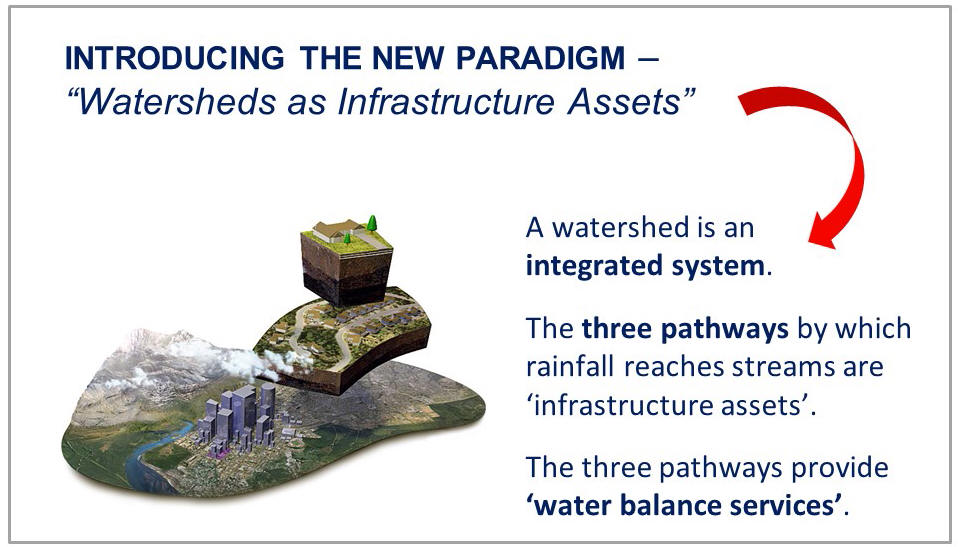PARTNERSHIP CELEBRATES 5-YR ANNIVERSARY: “We are creating a ‘sharing of experience’ about land development practices and stream health,” observes Peter Law, a founding Director
Note to Reader:
The incorporation date for the Partnership for Water Sustainability in BC, a not-for-profit society, is November 19, 2010. To celebrate the 5-year anniversary of this milestone, those who have played leadership roles are providing their reflections on what has been accomplished over the years. This encompasses the period leading up to incorporation and the five years since incorporation.
In this post, Peter Law provides his reflections. He is a founding and current member of the Board of Directors. He retired from the BC Ministry of Environment in 2010 after 33 years of service and immediately transitioned into a leadership role with the Partnership. While with the Ministry, Peter chaired the inter-governmental steering committee that was responsible for Stormwater Planning: A Guidebook for British Columbia, released in 2002.
A Watershed is a Whole System
“The reason I joined the Partnership for Water Sustainability in the early days of ‘incorporation’ was to be an advocate for educating local communities, land decision makers and the stewardship communities about the need to move from awareness to action. We need to both reduce the demand for water and protect stream health from the adverse consequences of land development practices,” recalls Peter Law.
“Over the years, the important role of ‘showcasing’ through e-newsletters on a weekly basis, the importance of tackling the land development practices issue at many levels, has been a great success in my opinion.…..and I can provide an example of how informative these articles are for me.”
 “It was through my work as a Provincial Fish Biologist that I became aware first-hand of the issue of water sustainability and watershed health. At the BC Ministry, I worked on issues related to fish habitat impacts from land development. It became obvious to me over the years that 90% of the problems fish experience in small urban streams are caused by land use decisions and activities in the watershed. In the work we did to develop the 2002 Stormater Planning Guidebook, I felt it was important to showcase the science from the University of Washington that linked impacts to fish and fish habitat with changes associated with land development.”
“It was through my work as a Provincial Fish Biologist that I became aware first-hand of the issue of water sustainability and watershed health. At the BC Ministry, I worked on issues related to fish habitat impacts from land development. It became obvious to me over the years that 90% of the problems fish experience in small urban streams are caused by land use decisions and activities in the watershed. In the work we did to develop the 2002 Stormater Planning Guidebook, I felt it was important to showcase the science from the University of Washington that linked impacts to fish and fish habitat with changes associated with land development.”
To Learn More:
Looking back, the salmon crisis of the 1990s was the catalyst for action. The goal of protecting stream health became a driver for action in BC. By 2002, as an implementation action resulting from enactment of the Fish Protection Act (1997), the Province released Stormwater Planning: A Guidebook for British Columbia. To read an article that elaborates on Peter Law’s perspective, click on Released in 2002, ‘Stormwater Planning: A Guidebook for British Columbia’ has proven to be a catalyst for action
Understand the Significance of the Three Flow Paths
“In April 2015, the Partnership posted an article titled: “The key to the Whole Systems approach is understanding the integrated significance of the three flow paths in a watershed,” says Chris May, Kitsap County. This article focused on the work of University of Washington researchers (Richard Horner and Chris May) and highlighted how they have evolved their thinking on the subject of stormwater impacts to small stream hydrology over the past 30 years.”
“The bottom line is that…we are on the right tract here in BC. This article, along with the many hundreds of informative (weekly) posts to ‘waterbucket.ca’ is creating a ‘sharing of experience’ that many of us in this field need to be aware of…especially when we can benefit from researchers like Horner and May with 20-plus years of experience,” concludes Peter Law.
To Learn More:
The most complete reference to all stream research undertaken by Richard Horner and Chris May is their final report to the United States Environmental Protection Agency, published in 2004.
For an historical perspective on implementation of the hydrology-based framework in BC, click on Rainwater Management in a Watershed Context – What’s the Goal?



